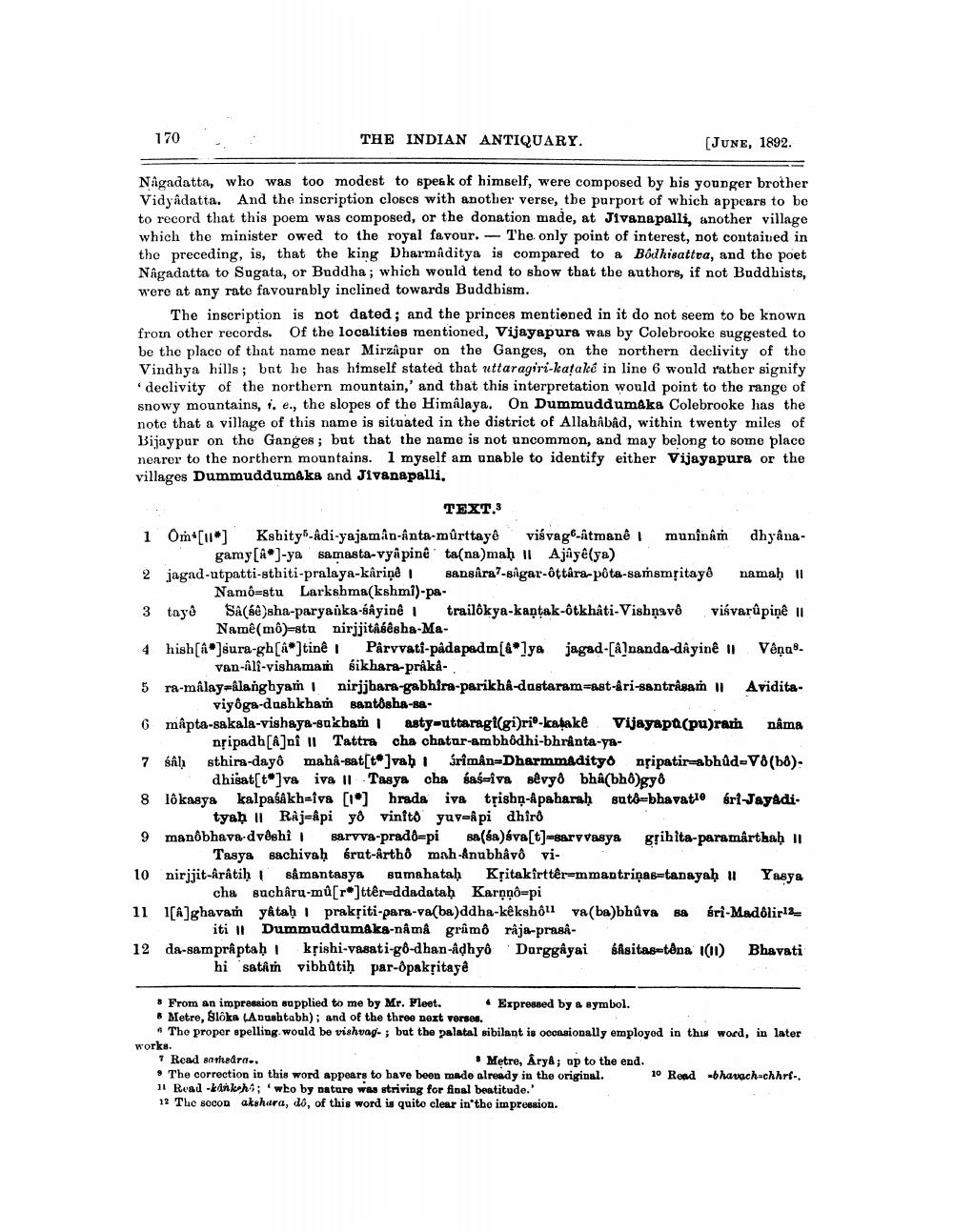________________
170
THE INDIAN ANTIQUARY.
(JUNE, 1892.
Nagadatta, who was too modest to speak of himself, were composed by his younger brother Vidyâdatta. And the inscription closes with another verse, the purport of which appears to be to record that this poem was composed, or the donation made, at Jivanapalli, another village which the minister owed to the royal favour. - The only point of interest, not contained in the preceding, is, that the king Dharmiditya is compared to a Bodhisattva, and the poet Nagadatta to Sugata, or Buddha; which would tend to show that the authors, if not Buddhists, were at any rate favourably inclined towards Buddhism.
The inscription is not dated; and the princes mentioned in it do not seem to be known from other records. Of the localities mentioned, Vijayapura was by Colebrooke suggested to be the place of that name near Mirzapur on the Ganges, on the northern declivity of the Vindhya hills; but he has himself stated that uttaragiri-kataké in line 6 would rather signify
declivity of the northern mountain,' and that this interpretation would point to the range of snowy mountains, i, e., the slopes of the Himalaya. On Dummuddumka Colebrooke has the note that a village of this name is situated in the district of Allahâbâd, within twenty miles of Bijaypur on the Ganges; but that the name is not uncommon, and may belong to some place nearer to the northern mountains. I myself am unable to identify either Vijayapura or the villages Dummuddumaka and Jivanapalli,
TEXT. 1 Om*[11] Kshity5-Adi-yajaman-ânta-mûrttayê visvage-atmanê muninâm dhyana
gamy(A)-ya samasta-vyâ pine ta(na)mah | Ajayelya) 2 jagad-utpatti-sthiti-pralaya-kariņé sansara7-sigar-öttára-pōta-saṁsmpitayo namah 11
Namô=stu Larkshma(kshmi)-pa3 tayê Sa(sl)sha-paryanka-skyine I trailokya-kantak-otkhâti-Vishņsve višvarūpiņê 11
Name(m)stu nirjjitácêsha-Ma4 hish[a]sura-gh[&*]tine! Pârvvati-pâdapadm[4*lya jagad-Câlnanda-dậyinê | Vêņas
van-ali-vishaman sikhara-pråkå5 ra-malay=&langhyam I nirjjhara-gabhira-parikhå-dastaram=est-ari-santrâsaṁ Avidita
viyoga-dushkhan santosha-sa6 måpta-sakala-vishaya-sokban asty-uttaragi(gi)rio-kabake Vijayapa (pu)ram nama
pripadh Anil Tattra cha chatur-ambhôdhi-bhranta-ya7 sah sthira-dayô mahå-sat[t]vah i śrimn=Dharmmadityo nsipatir-abhud-V(68)
dhisat[t"]va iva | Tasya cha sasziva sêvyo bha(bhogy8 8 lôkasya kalpasakh=iva [1] hrada iva tộishṇ-Apaharaḥ sutô=bhavati srl-Jayadi.
tyaḥ || Raj=&pi yo vinito yuv-Api dhirð 9 manôbhava-dvdshi | sarvva-pradô=pisa (sa)áva(t)-sarvvasya grihita-paramarthah 11
Tasya sachivaḥ śrut-Arthô mah-Anubhâvô vi10 nirjjit-ârâtih sâmantasya bumahatah Kțitakîrttêr=mmantriņas-tanayaḥ u Yasya
cha suchåru-mu[r*]ttêr=ddadataḥ Karoņô=pi 11 1[A]ghavan yâtaḥ praksiti-para-va(ba)ddha-kêkshóll va(ba)bhůva sa sri-Madôlir12–
iti il Dummuddumaka-nâmå grâmở raja-prasa12 da-samprâptaḥ! kļishi-vasati-gô-dhan-adhyo Darggâyai sisitasetêna (1) Bhavati
hi satan vibhûtiḥ par-Opakritage
* From an impression supplied to me by Mr. Pleet. Expressed by a symbol. * Metre, Sloka LADushtabh); and of the three next verses.
* The proper spelling would be vishvag-, but the palatal sibilant is consionally employod in this woed, in later works. Read on thedra..
• Metre, Ary&; up to the end. The correction in this word appears to bave been made already in the original. 10 Rond -bhavach-chhrf-. 11 Road -kanksha; who by nature was striving for final beatitude.' 12 The socon akshara, do, of this word is quito clear in the impression.




